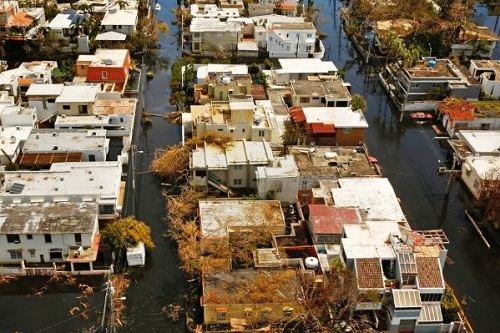AFP photo
By
Ricardo Swire
The recent one-two-three punch of Hurricanes Irma, Jose and Maria decimated some Caribbean islands and created an internal security nightmare. On Monday September 18, 2017 Hurricane Maria’s explosive intensification doubled its wind speed. Initial eighty miles per hour or one hundred and thirty kilometers per hour gusts became one hundred and sixty mph or two hundred and sixty kph bursts.
The apocalyptic weather system’s Category 5 wind and rain wiped out homes, businesses and social order. Hurricane Maria was the first Category 5 hurricane to strike Dominica. Other severely affected islands were Barbuda, Cuba, St Maarten, Puerto Rico, the United States (USVI) and British Virgin Islands (BVI). Internal security reports from St Thomas informed that food supplies will be exhausted before new stocks arrive. Gas and diesel are running out. The island was damaged so severely that residents with continental US homes departed St Thomas.
Of the three main USVIs, St John was pummelled the worst, three out of every five homes left without roofs. During the weather assault mariners encountered fifteen feet waves in open water, one hundred and sixty nautical miles off St John’s Great Bay district, messages only communicated via VHF radio and satellite transmissions. A minimum of fifty-four Caribbean and south-eastern United States residents were killed. The National Hurricane Centre described Hurricane Maria as the most powerful to make landfall in Puerto Rico since 1928.
French officials on Guadeloupe labelled the multiple weather systems’ blow a “natural catastrophe,” the September destruction comparable only to a 1931 Category 4 Hurricane that passed west of the Windward Islands and killed approximately two thousand, five hundred Belizean residents. Belize is a costal country in Central America. The latest devastation caused continuous absence of electricity, shortages of potable water and food on affected islands making security and safety a tedious duty.
Four years ago CARICOM’s Crime & Security Strategy (CCSS) was introduced. The collaborative effort between CCSS, the Organization of American States’ (OAS) Secretariat for Multidimensional Security and CARICOM IMPACS ensures planned effective responses. Officials refer to the activity as “Smart Security.” Outside military, police, select private security and academic circles internal security issues are rarely part of fact-finding discourses concerning the Caribbean.
Regional internal security is routinely punctuated by multiple interacting stresses influences and transformative events that also pose significant consequences for America and other invested international countries. During the Cold War era these tropical islands’ contiguity with America qualified Cuba as focal point of a threat to start nuclear war. Fast forward to the present, Caribbean islands are popular with America, its geopolitical rivals, transnational criminal organizations, drugs and human traffickers alike, as a lucrative strategic region.
Periodic superficial discussions about small island governance and security challenges usually exclude the fact that expansive maritime and air borders make up the Caribbean region. Islands with small population densities have experienced disproportionate challenges from globalization and a hyper-connected world that are beyond local response capabilities. Additionally, these tropical islands are extremely susceptible to climate/weather phenomenon and international economic conditions. Often external assistance is needed. The prompt Regional Security System (RSS) Hurricane Maria response, to affected CARICOM member states, is supported by the United Kingdom.
Barbados’ Grantley Adams International Airport (GAIA) was utilized as the main relief launching pad for air resources and deployed by the British government in collaboration with the Caribbean Disaster Management Agency (CDEMA). Four British humanitarian experts are assigned to help quantify needs assessments and coordination of £32 million worth of aid. The Navy vessel HMS Ocean was deployed to the Caribbean for help in reconstruction activity. Royal Fleet Auxiliary Mounts Bay has also provided assistance delivering equipment such as all-terrain vehicles, tents and portable facilities to purify water.
Royal Marines and Engineers landed on affected islands to repair essential services. The British Overseas Territories Department of Disaster Management recently allowed commercial flights to recommence landing at the Terrance B. Lettsome International Airport on Beef Island east of Tortola. The BVI Airports Authority advises passengers to arrive at least three hours before departure times. Turks & Caicos’ Providenciales, North and Middle Caicos, as well as South Caicos, water and power are restored. All roads cleared of debris and aircraft are flying in and out of airports on Providenciales and Grand Turk islands.
Ricardo Swire
Ricardo Swire is the Principal Consultant at R-L-H Security Consultants & Business Support Services and writes on a number of important issues.



No Comments Yet!
You can be first to comment this post!